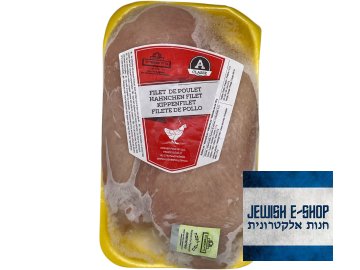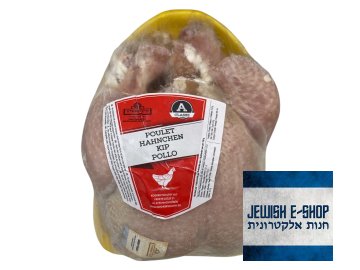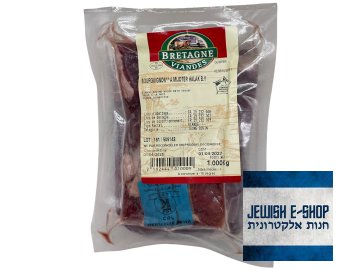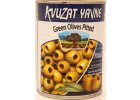Kosher Food
Product sorting
List of products

Do you have a craving for crisps? Then here are Bissli kosher crisps with REMIX flavour 100% kosher, 100% Israeli. Made in Israel!Expiry date: 13.4. 2026

Kosher hot chili peppers from Israel - Shipka Hot Peppers. 100% Kosher for Passover, 540 gr.

Jerusalem Matzos since 1902 - matzo meal for Passover 100% KOSHER for Passover - 454 gramsMinimum expiration date: 2.2.2026

Pancake mix, kosher for Passover - Jerusalem Matzos400 gramsMakes up to 30 delicious and fluffy pancakesIngredients: Passover matzo meal (contains gluten), sugar, raising agents...

Capel wine juice 1l - kosher grape juice for Kiddush and Havdallah Best before: 03/2026

Gefilte fish - 6pcs, in brine, POLISH STYLE. Made in Israel - 100% Kosher, Kosher for Passover, Parve. Best before: 23. 01. 2029 Ingredients: water, fish 25.7% (carp, silver...

Kosher Chicken Breast - weights from 500 grams and upOrigin. Kosher for Passover.Slaughtered 20 May 2025, frozen 22 May 2025Consume by November 18, 2026Shipping:Personal...

Kosher whole chicken - weight categories to choose from approx. 1.600 gramsOrigin: Hungary. Kosher for Passover.Date of slaughter: 19 May 2025, frozen 21 May 2025Minimum...

Whole kosher beef for goulash from France - Kosher Halak Beit YosefApproximate weight 1000 gramsFrozen 01.04.2025Consume by 1.04.2027Postage:Personal collection (Belgická 27,...
Listing controls
What does kosher mean?
In gastronomy, the word kosher (כשר, kasher), also transcribed as kosher in English, refers to foods and beverages that meet a set of Jewish regulations and dietary habits known as kashrut (כשרות). In a broader sense, kosher in Judaism refers to anything that is ritually fit, in accordance with regulations, and what is correct, proper, or acceptable. This word has a similar meaning in many national languages, including Czech and English. In Czech, there is also an obsolete word "košer" which is a name for a Jewish butcher, commonly referred to as a shochet. It's important to remember that Jewish cuisine dishes are not kosher unless they are prepared in accordance with kashrut.
What is and isn't kosher is determined by the Torah, specifically in the sections of Va-Yikra (Leviticus) and Devarim (Deuteronomy). Kashrut has no justification and falls into the category known as chukim, i.e., rules whose reason is the necessity to "obey G-d and imitate His holiness." In connection with kashrut, two supporting arguments are often mentioned, which, however, are not the reason for its existence. These include hygienic/dietary reasons and educational reasons. While the first mentions the need to avoid easily perishable foods as a reason, the second serves as a constant reminder of Judaism and Jewish education of children.
The Torah lists permitted and forbidden animals (for some groups only forbidden ones). Among mammals, it is possible to eat animals that are even-toed ungulates (have completely split hooves) and ruminants. This group includes cattle, sheep, goats, big game (e.g., deer, bison). Forbidden and unclean mammals include pigs, rabbits, hares, horses, etc. In the case of birds, the Torah explicitly lists forbidden species, which mainly fall into the group of predators and scavengers. Permitted species include domestic poultry (chickens, ducks, geese, turkeys, quails, pigeons, or pheasants), and in the past, peacock was also eaten as kosher. Milk and eggs can only be consumed from animals that are themselves kosher. It is possible to eat all fish that have fins and are scaly, with the scales having to be ctenoid or cycloid. Predatory fish, eels, sharks, rays, sturgeons (including caviar), and seafood are forbidden. Among other animals, it is forbidden to eat reptiles and amphibians, and except for a selected number of locusts, insects as well (locusts are a specialty especially of Yemeni Jews). Explicitly forbidden are dead animals and carcasses (nevela) and sick and torn animals (trefa).
One of the principles of kashrut is the strict prohibition of mixing meat (basar) and dairy (chalav) foods, which is based on the verse "you shall not boil a kid in its mother's milk." This means that it is forbidden both to cook such foods together and to consume them. In Jewish households observing kashrut, there is separate tableware and kitchen utensils for meat and dairy foods. It is also forbidden to benefit from the sale of such mixed foods. In the case of separate consumption of dairy and then meat dishes or vice versa, there is a time limit that must elapse between individual courses. These time limits differ among individual Jewish communities. This period is shorter when you eat a dairy dish first and then a meat dish (does not apply to hard cheeses). It is usually half an hour, or you can eat some parve (Parve is a dish that is neither meat nor dairy. This includes fruits, vegetables, grains, eggs, fish, pasta, etc.) and rinse your mouth. In the opposite order, i.e., first a meat dish and then a dairy dish, the time is much longer and depending on individual communities ranges from one to six hours.
The consumption of blood is strictly forbidden. This prohibition is based on the verse from the Torah "whoever eats any blood will be cut off from his people." The Torah also provides a justification, namely that "the life of the body is in the blood." Blood is removed from the animal's body by a prescribed special slaughter (shechita) and then its remnants are removed by a technique known as melicha. This prohibition does not apply to fish.
The Rabbinate of the Jewish Community in Prague annually publishes a guide to kosher foods, which lists suitable shops, products, foods, beverages, but also forbidden non-kosher additives.
Meat from kosher animals does not automatically become kosher. It must undergo a special type of slaughter (shechita), which is performed by a specially trained Jewish butcher (shochet). The essence of shechita is that the animal does not suffer during slaughter, and that all blood, whose consumption is strictly forbidden, is removed from the body. During slaughter, the shochet cuts the animal's throat with a special sharp knife (chalaf), which must not contain any unevenness or tooth. This cut simultaneously severs the neck veins, arteries, larynx, and esophagus, resulting in a sharp drop in blood pressure in the brain and immediate loss of consciousness. Thanks to this slaughter, the animal feels no pain. There are five halachic regulations set out in the Shulchan Aruch (Yoreh De'ah 23) that the shochet must follow.
Residual blood is removed from the meat by a special set of procedures (melicha). The meat is first immersed in cold water for about half an hour, which results in the opening of the pores. It is then placed on an inclined board and sprinkled with coarse salt, which removes blood from the meat due to the principle of osmosis. After completing melicha, the meat needs to be washed. However, this technique cannot be used for all types of meat. This mainly concerns organs such as liver, heart, or lungs. Liver can be prepared by salting and roasting over fire (kashering), which is also an alternative method for preparing other meats. Tendons and the venous system must also be removed from the meat. After slaughter, the animal is thoroughly inspected and if even the slightest defect is found, disease detected, etc., the animal automatically ceases to be kosher.
For a restaurant (but also a home kitchen) to be kosher, it must have separate dishes and kitchen utensils for meat and dairy products. It is also not possible to wash these two types of dishes together (e.g., in a dishwasher or sink). However, it is not forbidden to store both types of food in one refrigerator, provided they have their permanent place. A special procedure for contaminating dishes with non-kosher food, chametz, or contact between meat and dairy products is kashering. This is done either by boiling or burning over a flame (libun).
Kosher products have a kosher certification on their packaging. This is a special symbol, known as a hechsher (הכשר), which informs the consumer that the product was manufactured and processed under rabbinical supervision, and thus meets the requirements of kashrut. In the Czech Republic, the only authorized issuer of hechsher is the Rabbinate of the Jewish Community in Prague. In the United States, the largest authorities issuing hechshers include Orthodox Union, OK Kosher Certification, and Kof-K. The hechsher may be supplemented with a letter indicating the nature of the product (D for dairy products, M for meat, P for Passover, and Pareve for parve products). The certification itself takes place when a company seeking certification is visited by a mashgiach (משגיח), who checks the production process and procedures, the facility itself, recipes, and suitable and unsuitable additives. He then decides on granting kosher certification.













